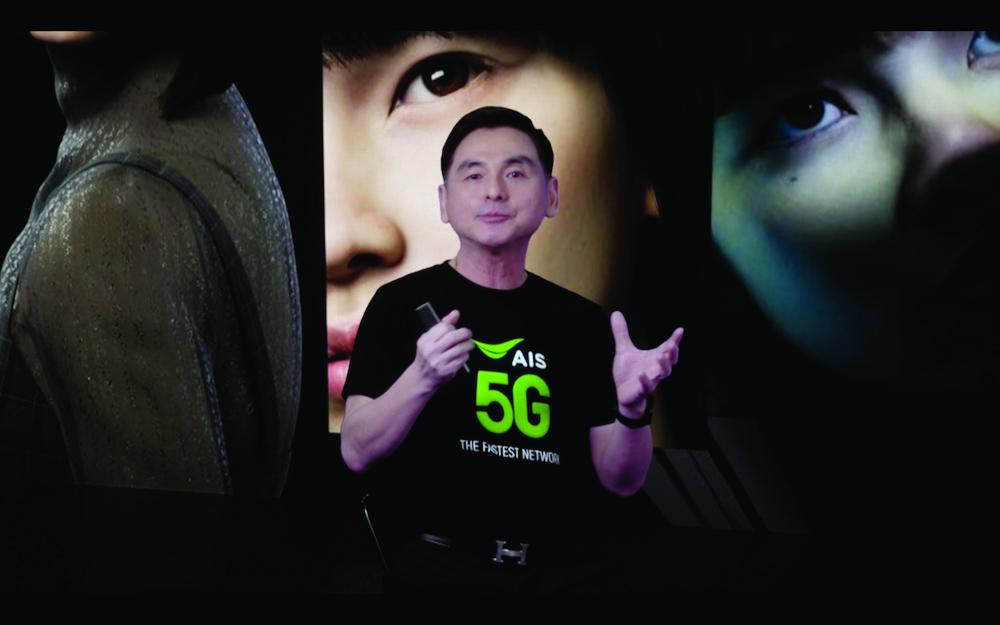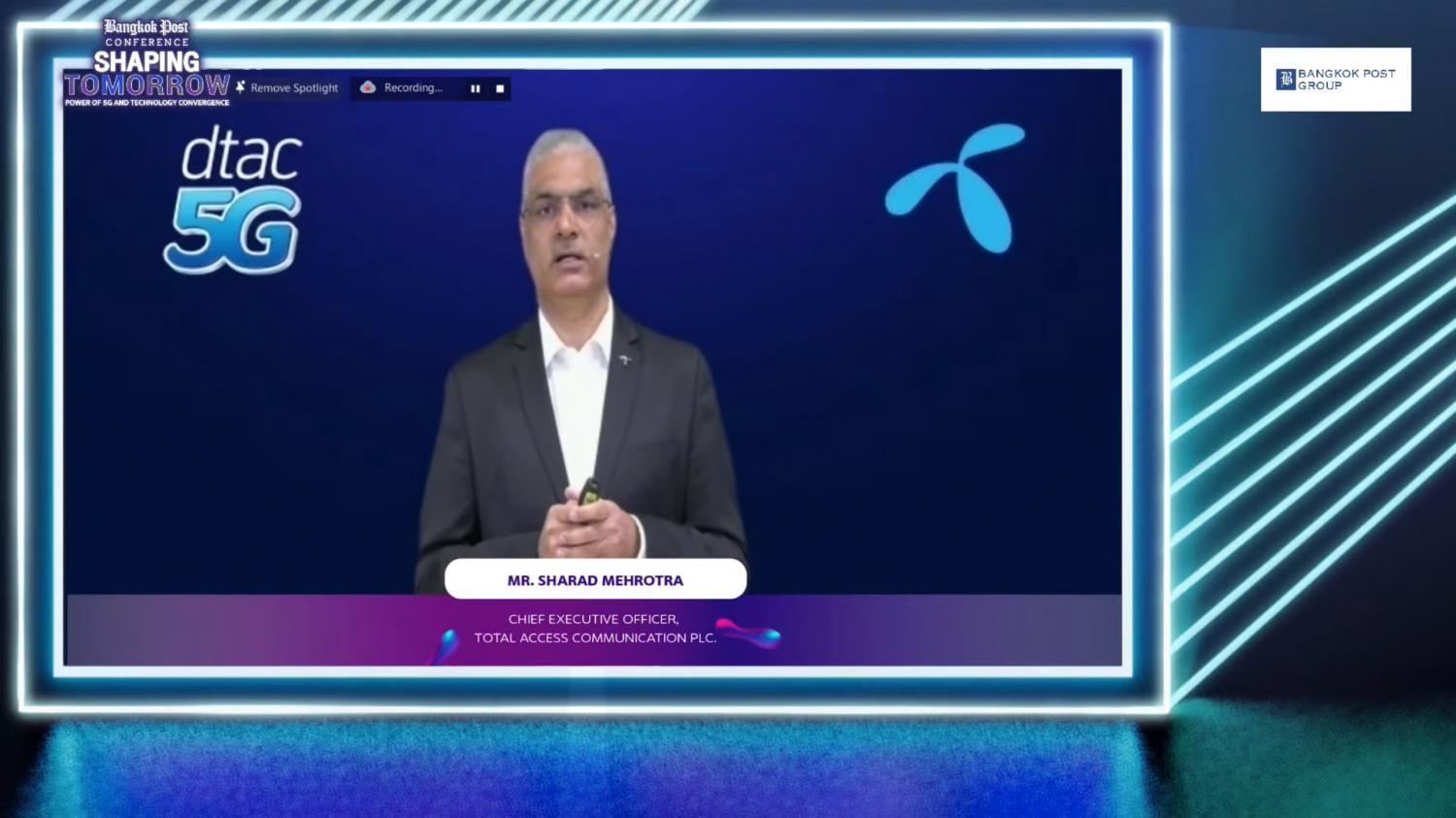
5G has the potential to unlock digital power for business operations, new lifestyles, healthcare and agriculture in the years to come and bring national competitiveness to the next level, say leading telecom operators.
The ultra-fast wireless network should also speed up the convergence of the physical world and the digital sphere, ushering new opportunities for business and catering to new customer experiences.
The operators were speaking at the Bangkok Post conference entitled "Shaping Tomorrow: Power of 5G and Technology Convergence", held online yesterday.
THREE CORE PILLARS
Somchai Lertsutiwong, chief executive of Advanced Info Service (AIS), said collaboration between the government and the private sector is needed to enhance competitiveness, driven by the strength of 5G infrastructure and adoption.
As for much faster digitisation and new business models, the government is urged to provide more support to ease the burden of the private sector and capitalise on innovation implementation amid new digital lifestyles, he said.
"5G tech adoption and development in Thailand is not inferior to other countries globally, thanks to 5G licence auctions and serious investment from major operators for years," said Mr Somchai.
Early adoption of 5G benefits various sectors, including innovation platforms and solutions in manufacturing, retail, healthcare and agriculture, he said.
"The strength of the 5G infrastructure and its ecosystem development is led by major operators' continued investment," said Mr Somchai.
5G can help a smaller country compete with larger economies if it has strong innovations and service platform development. However, proper promotion of 5G adoption and investment is needed to ensure success, he said.
Mr Somchai urged government and private sector cooperation to drive 5G development as they all play a key role in determining the future.
Amid the three parties, the government is the most needed to provide greater support while operators are committed to continuously investing in 5G networks and people are eager to adopt innovations.
The Chinese government provides a good example as it gave away spectrum bandwidth to mobile operators to support 5G rollout, he said.
Mr Somchai said the 5G market value in Thailand could reach US$1.2 trillion by 2025.
The three core markets for 5G with potential for growth are home internet through Fixed Wireless Access devices, mobile internet and business-to-business in the industrial sector, with an emphasis on manufacturing, retail and logistics.
He said 5G could also contribute to three aspects of digital lifestyles.
First, 5G technology can support people to work or study anywhere and any time. Second, through 5G, data drawn from people's behaviour can be analysed to gain insight and personalised services.
Lastly, 5G will blur the line between physical and virtual worlds with more people becoming engaged in the online world, such as shopping, studying and content consumption.
COMPETITIVE BOOST

Mr Natwut pushes partnerships.
Natwut Amornvivat, co-president of True Corporation, said a complete 5G ecosystem will truly lift the country's competitiveness and the company has been developing the 5G ecosystem both directly and through partnerships.
Currently, True operates a digital entertainment community, retail, logistics, commerce, media and content, finance and payment, mobile service and hi-speed internet as well as smart solutions.
True is also equipped with a complete ecosystem comprising True digital park its 5G innovation hub, True digital economy for building digital talent, True data centres and cloud services, and True digital that enables digital transformation. This ecosystem is centrally connected by 5G infrastructure.
True digital park now demonstrates 5G world tech X as the tech show for digital exponential world, including AR glasses, and 50 solutions for the manufacturing sector co-provided by 35 tech partners.
"We strongly believe in partnership and a complete ecosystem that will provide most the proper benefits to customers via innovation platforms," he said.
Data is the new oil but Internet of Things (IoT) is how to drill for it. IoT powered by data analytics and artificial intelligence could transform physical resources to be real time and insights of consumers.
True has deployed innovation solutions and platforms for several sectors to support their digitalisation journey.
He cited examples including its health solutions working with Siriraj Hospital that provides telemedicine and medical tech ambulance.
True 5G has been deployed by the retail business to help stores proceed with data analytics while 5G-powered autonomous robots create seamless integration of physical and digital experiences.
The company has also deployed True's digital cow platform that can check livestock behaviour, perform accurate predictions and ensure productivity optimisation.
GET BACK TO SPEED

Mr Mehrotra sees opportunity.
Sharad Mehrotra, chief executive of Total Access Communication (DTAC), said Thailand could significantly boost its 5G development and economic recovery by unlocking the 3500MHz 5G spectrum.
He also highlighted the importance of public and private ecosystem when leveraging 5G for economic growth.
"There's the opportunity of the number one 5G band in the world, 3500 MHz, which is still missing from Thailand's 5G portfolio. That is the gold standard for 5G networks globally. Unlocking this spectrum in Thailand's will undoubtedly boost 5G development and economic recovery."
Mr Mehrotra said Thailand should overhaul regulations and facilitate access to thousands of sites as they need to be upgraded to 5G or built from scratch.
"Thailand's 5G adoption is happening much more slowly than it did in Korea. And Korea's 5G is 35 times faster than average download speeds in Thailand," he said.
"Although we were the first country in Asean to switch on 5G, there's now a risk of losing our leadership position. We need to do more to get back to speed."